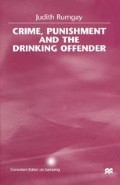Abstract
This chapter considers whether academic research and theory has undermined the confident ascription of criminal responsibility to intoxicated offenders. It is suggested that any concern that academic knowledge erodes the principle of free will is bolstered more by the deterministic expression of alcohol theory than by the substance of its research; and that academic theory about the alcohol—crime relationship often rests on commonsense assumptions. The chapter examines firstly the alcohol—crime association; secondly, academic interpretations of offenders’ theories of intoxicated crime; and thirdly, the major emphases of academic theories of the alcohol—crime relationship.
Access this chapter
Tax calculation will be finalised at checkout
Purchases are for personal use only
Preview
Unable to display preview. Download preview PDF.
Author information
Authors and Affiliations
Copyright information
© 1998 Judith Rumgay
About this chapter
Cite this chapter
Rumgay, J. (1998). Theories of Intoxicated Crime. In: Crime, Punishment and the Drinking Offender. Palgrave Macmillan, London. https://doi.org/10.1007/978-1-349-26919-8_2
Download citation
DOI: https://doi.org/10.1007/978-1-349-26919-8_2
Publisher Name: Palgrave Macmillan, London
Print ISBN: 978-1-349-26921-1
Online ISBN: 978-1-349-26919-8
eBook Packages: Palgrave Social & Cultural Studies CollectionSocial Sciences (R0)

